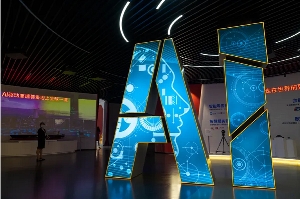 AI might be able to create a coherent plot but emotional depth will be missing, experts say
AI might be able to create a coherent plot but emotional depth will be missing, experts say
A recent gathering of communication professionals and storytelling enthusiasts has sparked conversations around the role of generative AI in creative work.
The event, dubbed "Storytelling Hangout,” and organized by ThinkStories Africa, saw professionals across the continent voice concerns about the growing reliance of creatives on artificial intelligence, cautioning against the risks of losing the human touch in creative content.
The hangout was attended by a diverse group of communication professionals with librarian, literary and visual storyteller, Felene Cayetano; independent publishing expert, Porsché Mysticque Steele; and creative writer and editor, Nana Nyarko Boateng, being the panel.
In her remarks, Nana Nyarko Boateng, emphasized the need for communicators to approach generative AI as a tool rather than a substitute for human creativity.
She explained that generative AI could be used as a starting point in their work but warned that heavy dependence on it during the creative process will result in a lack of emotional depth.
“I personally wouldn’t use AI to write stories, but it is a tool. If you are a writer who struggles with creating your outline, I don’t see why you shouldn’t use AI to get ideas. The danger is in relying entirely on AI to do your thinking and feeling for you,” the Ghanaian author said.
“AI might be able to create a coherent plot, and the structure of your story will be clear but emotional depth will be missing,” Nana Nyarko Boateng continued.
The writer also raised originality concerns about AI-produced stories since its output is a result of “pulling from existing patterns and a database,” adding that “there isn’t a unique perspective that AI can ever offer.”
Drawing from her experiences as a book coach, Porsche Mysticque Steele, intimated that a lot of people are enthused about being able to use AI, adding that the trend underscores the need to educate others on responsible and ethical practices when utilizing generative AI for storytelling.
She also disclosed that digital platforms were now flagging and taking down books that were entirely written using generative AI.
“A lot of clients I deal with will want to use AI which is a struggle for me because I must rewire them to understand that AI is not the answer to everything. In truth, AI is a tool, but it is not meant to write a whole book for you.
While admitting that generative AI was undermining the work of copywriters, the TEDx Speaker emphasized the need to educate professionals on using it as a tool.
“For us copywriters and editors, we are losing our jobs to AI, but my job is to educate people on how to use AI as a tool in tandem with their own personal creativity. If they are only going to use AI, then the human element in their personal creativity will be absent and that makes it a useless book,” she opined.
Visual storyteller, Felene Cayetano, also shared experiences where content produced by generated AI was wrought with inconsistencies and inaccuracies.
“A client was writing a book to chronicle her experiences about being vegan, but having used AI, it was included in the book that meat was the best way to get protein, which was contradicting the focus of the book,” she recounted.
She acknowledged the usefulness of using AI in speeding up the creative process but was quick to emphasize the need to maintain intellectual integrity.
“There will always be a faster way to get to wherever you want to go. Faster does not mean better. Anyone can reach the finish line quickly, but you should do so with integrity and being true to the message you want to communicate,” she expressed.
ThinkStories is a knowledge-sharing, networking, and skills-improvement platform for African communicators. Founded by Samuel Osei, a storyteller, and communications professional based in Ghana, West Africa, ThinkStories seeks to foreground the continent’s multiplex narrative by promoting the art of storytelling and broadening the conversation on how to build and influence global brands.